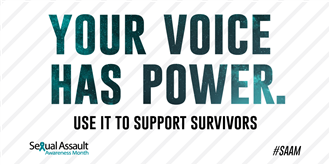
Embrace Your Voice
05 April 2018
Sexual assault awareness month, otherwise known as SAAM, has been around since 2001. This year, after the recent #MeToo movement, SAAM seems more prevalent as recent events have highlighted how much of an issue sexual assault remains to be. The National Sexual Violence Resource Centre (NSVRC) is leading the charge in making April the designated month to focus on the importance of ending sexual assault and giving a voice to victims who feel silenced. The focus for this year’s SAAM is ‘embrace your voice’ which aims to empower victims to come forward and report crimes against them as well as engage in the conversation about how we can prevent and end sexual violence.
The #MeToo campaign triggered an international conversation about how we all need to take a stand in stepping up to end harassment and sexual assault and how we need to continue to ‘promote safety, respect and equality towards ending sexual violence’.
The conversation about sexual violence is never easy but if we want it to end we need to take a stand against those who commit crimes and stand in support of victims. We can show our support by learning to understand what sexual violence is, knowing who to speak to if you or someone you know is a victim, wearing a blue ribbon in support of victims.
What is Sexual Violence?
People often have a misconception that sexual violence is sexual assault or rape and whilst it is these things it is also any type of unwanted sexual contact. It can include words and actions of sexual harassment and non-consensual sharing of private images – more commonly known as ‘revenge porn’.
The Statistics
The statistics of sexual assault are one of the many things this year that has made SAAM so important to acknowledge. The following statistics are from NSVRC website and Rape Crisis UK*:
- Approximately 85,000 women and 12,000 men are raped in England and Wales alone every year; that's roughly 11 rapes (of adults alone) every hour.
- 1 in 5 women aged 16 - 59 has experienced some form of sexual violence since the age of 16
- Only around 15% of those who experience sexual violence choose to report to the police
- 51.1% of female victims of rape reported being raped by an intimate partner and 40.8% by an acquaintance
- 52.4% of male victims report being raped by an acquaintance and 15.1% by a stranger
The staggering figures demonstrate just how much of an issue sexual assault is and that the conversation about ending sexual assault needs to remain current if we want to work towards making people safer.
Victims Are Never to Blame
Regardless of what someone is wearing, whether they have been drinking, whether they’re in a relationship with the person who abuses them, or how they had been acting towards their abuser, if someone says no, they mean no, and no external factors make that answer different. Victims should never feel responsible or ashamed of what has happened to them.
Why Do People Not Report?
As one of the previous statistics states only 15% of those who experience sexual violence report it to the police. So why don’t people report? The biggest reason is that so many victims fear they won’t be believed. Unfortunately, there has been several high-profile cases where victims reported that they felt there was a lack of support from the police, the justice system, and in some cases their place of work or college/university. In recent years many practices have been put in place to change this. There is now a system so that when you report to the police you will be believed from that moment onwards, they have worked closely with previous victims and charities to change the way reporting happens and ensure support is instant. Police stations now have ‘comfort suites’ that offer a calm and warm environment to report the crime in a bid to remove the stigma of a cold interrogation room that so many tv programmes depict. The MET police have lots of information on their website about the process and the support they ensure, you can read more here: https://www.met.police.uk/advice-and-information/rape-and-sexual-assault/what-happens-after-you-report-rape-or-sexual-assault/. A further reason people don’t report is because they fear other people’s reaction, a reason SAAM is so important is to openly show support to victims, that someone is always ready to listen, that you’ll be believed, and help is available whenever you want it.
Support and Assistance
Below are numbers, email addresses, online websites and links to find your local support centre for help if you or someone you know has been sexually assaulted.
Your Decision:
https://www.met.police.uk/mydecision - A step by step guide on your options if you have been sexually assaulted, you’re not sure if you’ve been sexually assaulted, or if someone you know has been sexual assaulted.
Survivors UK
https://www.survivorsuk.org/
07491816064
https://www.survivorsuk.org/ways-we-can-help/online-helpline/
Rape Crisis
https://rapecrisis.org.uk/
0808 802 9999
https://rapecrisis.org.uk/centres.php - Services in your local area
Victim Support
https://www.victimsupport.org.uk/
08 08 16 89 111
https://www.victimsupport.org.uk/help-and-support/get-help/support-near-you - Services in your area
The Havens
https://www.thehavens.org.uk/
020 3299 6900
* https://rapecrisis.org.uk/statistics.php
* https://www.nsvrc.org/statistics
Comments